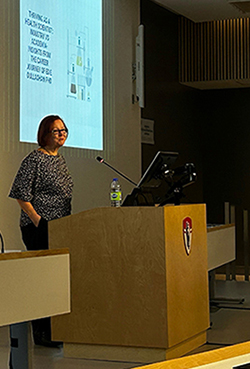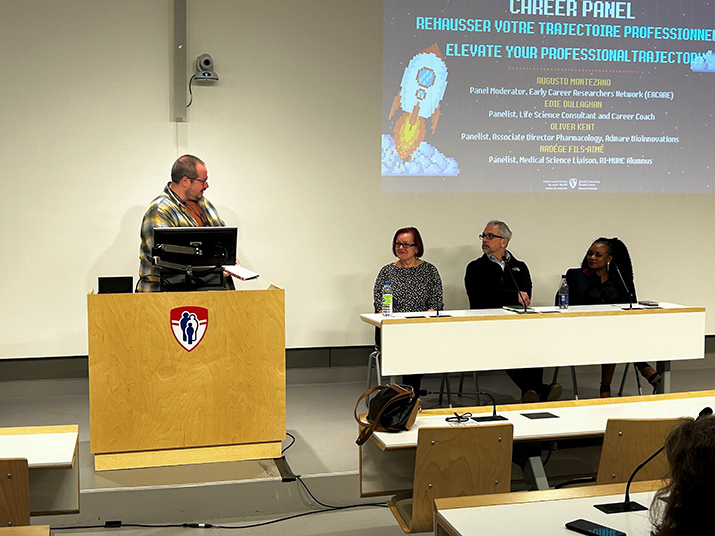
Breadcrumb
- News and Events
- News
- Content
- Connecting trainees and professionals on the road to success
null Connecting trainees and professionals on the road to success
The Career Half-Day hosted by the Desjardins Centre for Advanced Training facilitates networking between trainees and industry professionals
SOURCE: RI-MUHC
On November 3 the Desjardins Centre for Advanced Training (DCAT) hosted a Career Half-Day for Trainees, the fifth in its history and first in-person event of its kind since 2019. Held in the Cruess Auditorium at the Glen site of the Research Institute of the McGill University Health Centre (RI-MUHC), the Career Half-Day for Trainees provided 88 trainees with valuable insights for their journey in research and beyond.

A video message from DCAT director Dr. Miguel Burnier and special guest Edie Dullaghan, PhD, followed introductory comments by Emily Bell, PhD. Edie Dullaghan is scientific director of adMare Academy at adMare Bioinnovations in Vancouver, Canada. Her keynote speech outlined her personal experiences in academia, including mentorship early in her career and the impact of a co-op program.
“An important part of becoming industry-ready is connecting with a mentor,” she explained. “Find a champion – someone who believes in you.”
Edie Dullaghan spoke about the vital role of networking and making connections in order to be on the front line of potential opportunities as she outlined her own journey in search of a position in the pharmaceutical industry. She also emphasized the importance of understanding and developing other avenues – creative, social, industrial and behavioural skills – in order to become industry-ready.
A panel discussion titled “Elevate Your Professional Trajectory” followed. Moderated by Augusto Montezano, PhD, of the RI-MUHC’s EArly and mid-CAreer REsearchers network (EACARE), the panel was comprised of keynote speaker Edie Dullaghan, Oliver Kent, PhD, associate director of pharmacology at AdMare Bioinnovations, and Nadège Fils-Aimé, PhD, a former RI-MUHC trainee who now works as a medical science liaison in oncology at Merck.
Panelists outlined their own academic and work experiences before fielding questions from attendees. These questions included : How do I demonstrate my transferrable skills? What career options are available to me with a Masters, PhD, or postdoctoral fellowship? How can I become more familiar with the Canadian biosciences network or systems of hiring if I am an international student? How can I find the mentorship I need in the field of work I want to be in? Other topics covered included the relevance of different degrees in industrial roles, the importance of knowing your own value when applying to a job, and the integration of publications in a resumé.

Closing remarks were given by Dr. Louise Pilote, Deputy Executive Director and Deputy Chief Scientific Officer of the RI-MUHC, Marie-Hélène Laramée, president and CEO of the MUHC Foundation, and Michel Cantin, vice-president of development and partnerships at Desjardins, who announced Desjardins’ continuing support of DCAT for the 2023 – 2027 period with a $500,000 donation.
Trainees then shared a networking lunch in the RI-MUHC Atrium with professionals who gave insight on their own trajectories and experiences in the field. Alexandra Cooke, PhD, a clinical research associate at Medpace and former RI-MUHC trainee, was among the 20 professionals who attended.
“I came here to talk about my role and help students who are looking to grow their network and move into these kinds of positions,” said Alexandra Cooke. “I’ve been in their shoes, not knowing what I wanted to do, and it really helped me to meet different professionals doing different things outside of academia. I found it really helpful at the time to have group conversations and find out about the day-to-day of these positions, what it looks like and how they got there. I wanted to do that for these students today.”
These positive sentiments were echoed by doctoral student Julia Messina-Pacheco, who studies in the Cancer Research Program with scientist Alex Gregorieff, PhD.
“I wanted some exposure to different career opportunities,” she explains. “Lately, I’ve been interested in science policy and I just don’t want to narrow my scope too much. I wanted to expose myself to some other paths that I might not have thought about before. The professionals gave us really valuable insight into the day-to-day of these different jobs and also taught us how to leverage some of the soft skills we develop during our PhDs and Master’s and develop them into skills that industries are looking for.”
“We received positive feedback from many trainees who valued the group networking format,” said DCAT coordinator Ariel de Roo. “It provided an inclusive space where both vocal and reserved trainees could benefit — whether by asking questions or absorbing the discussions at their respective tables.”
“It was a day filled with energy and optimism, and we are incredibly grateful to the professionals and alumni who joined us for lunch to showcase the wide range of career options available after obtaining a graduate degree,” said Emily Bell. “The generous support of many alumni in giving back to the RI-MUHC community greatly influences the experience of current trainees.”

November 17, 2023